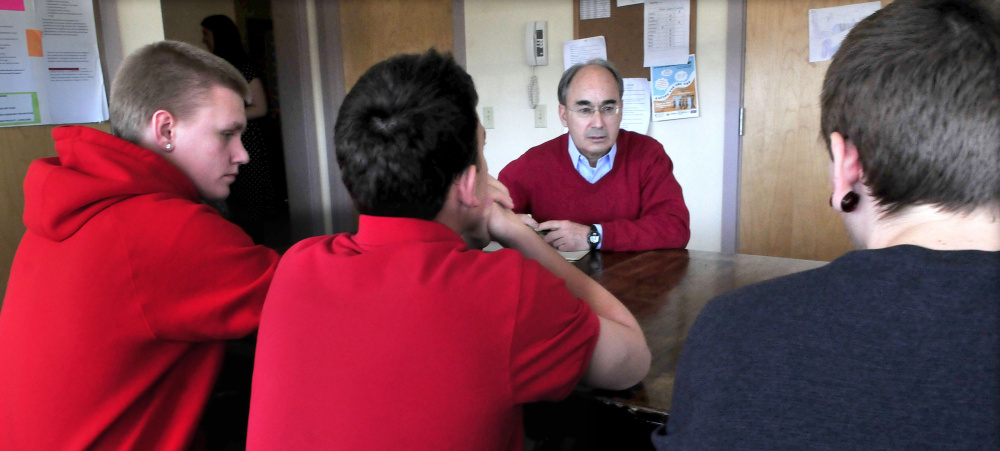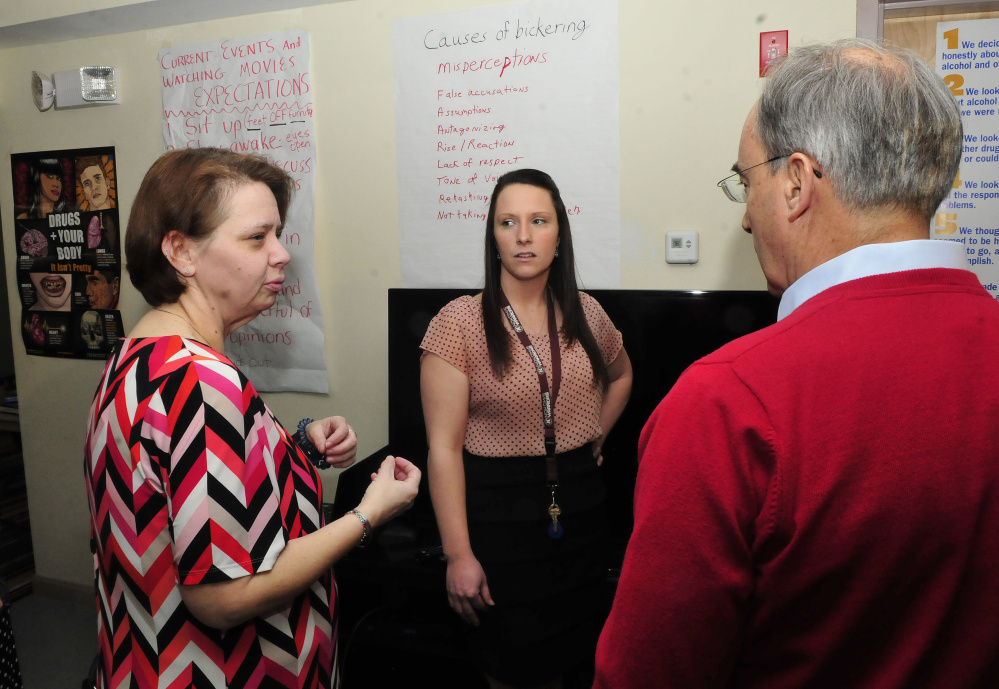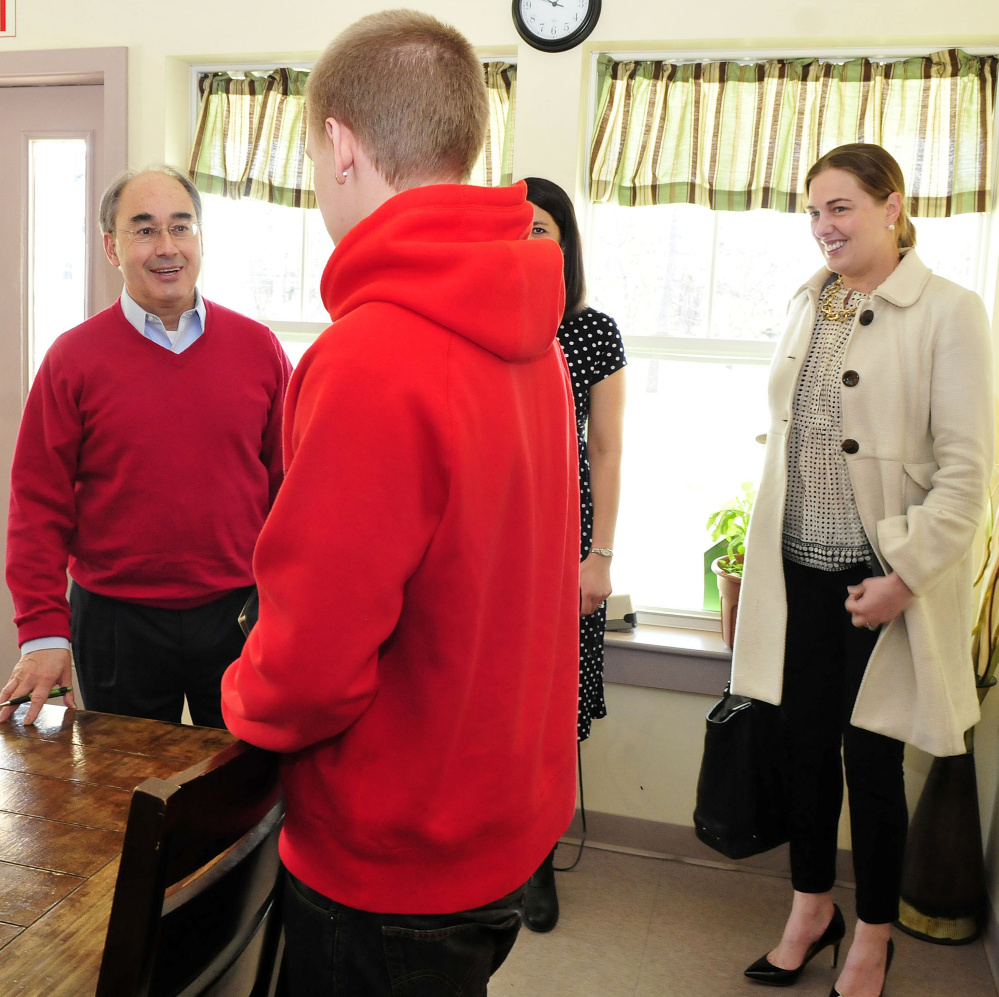FAIRFIELD — Kyle Hendrickson said he fell in with the wrong crowd. He smoked marijuana, drank alcohol and used other drugs, started stealing and got caught by police while breaking into a building.
After he was arrested for violating his probation, the teenager was locked up in a state juvenile detention center. He enrolled at another residential program in Hollis but got kicked out after two months when he was arrested for receiving stolen property.
Hendrickson hasn’t been home for eight months. Now he’s one-third of the way through a six-month program at Day One, which has three Maine residential centers and provides outpatient services and counseling to young people who are mostly battling drug abuse.
Hendrickson, 18, said he likes the structure and strict program at the home near the Good Will-Hinckley campus.
“I don’t want to get back into my old ways,” he said.
Hendrickson spoke Tuesday as U.S. Rep. Bruce Poliquin, R-2nd District, visited the program at Good Will-Hinckley. Poliquin, who is a member of the Congressional Bipartisan Task Force to Combat the Heroin Epidemic, toured the Day One program as part of a swing through central Maine. Poliquin also held a round-table discussion and did a ride-along Tuesday afternoon with the Franklin County Sheriff’s Office to get an idea of what people on the ground are facing in the drug crisis.
“It is not just the 2nd District. It is not just Maine. It is a national emergency,” the congressman said.
A PLACE TO GO
When he leaves Day One, Hendrickson said, he plans to live with his father, stay sober and distance himself from the people and situations that got him in trouble in the first place. Hendrickson said he isn’t sure what he’ll do about going back to school or finding a job.
Part of the challenge for Day One is keeping track of clients after they have finished the six-month program, said Joanne Grant, the director of residential services at the Good Will-Hinckley campus. The agency has a contract with the state to provide the half-year program and 18 months of three-days-a-week intensive outpatient care.
Day One works with clients to develop plans to transition and stay healthy after the program, including intensive outpatient care when they leave. But it can be hard to connect clients with face-to-face counseling after they have left, often because they don’t have a way to get to the Day One offices in South Portland, Grant said. In many cases, young people don’t have a place to live, a job or a support network to help them when they leave the program, she said.
“Sometimes when they leave, there isn’t a place to go,” Grant said. “We make all these good plans, but sometimes the support isn’t there.”
About 90 percent of the clients at Day One residential programs are Department of Corrections referrals, and most have diagnosed mental health problems, she added. Grant, a 20-year veteran of counseling youth, said most of the clients who come through the doors at Day One are dealing with alcohol and marijuana abuse, but the number of clients dealing with addiction to heroin or prescription opioids has increased recently, as harder drugs have become more common in Maine.
The Fairfield residence has 14 beds and provides classroom education, group therapy, individual counseling and recreational activities, and it takes advantage of the resources at neighboring Good Will-Hinckley, which is also home to the Maine Academy of Natural Sciences, a charter school.
KEEPING TRACK
In a meeting with Poliquin, Day One clients and administrators talked Tuesday about the pervasive drug problem in the state and the challenges tackling it.
One teen told the congressman that it was easy to get heroin in Sanford, his hometown. “The town is pretty much flooded with stuff like that,” he said.
Another told Poliquin his concern about leaving the program is that he would fall in with his old friends and start using drugs and getting in trouble again.
When asked by Poliquin what could make it easier for them, both said that having more post-treatment counseling available near their homes would help a lot in terms of keeping them sober and healthy. Day One has only one outpatient location, in South Portland, a hard place to visit for someone who doesn’t have a permanent place to live or a car.
Keeping track of clients after they leave is difficult, staff members said.
Poliquin, in an interview after the meeting, said the issues highlighted by Grant and residents at Day One were troubling.
“How do you hold people accountable when they leave here?” Poliquin said. Part of the equation was making sure people could find a job and make a living when they leave the program, he said, but another part was “tough love.”
“When they get out, make sure there are programs to hold them accountable for staying healthy,” he said.
Peter McGuire can be contacted at 861-9239 or at:
pmcguire@centralmaine.com
Send questions/comments to the editors.





Success. Please wait for the page to reload. If the page does not reload within 5 seconds, please refresh the page.
Enter your email and password to access comments.
Hi, to comment on stories you must . This profile is in addition to your subscription and website login.
Already have a commenting profile? .
Invalid username/password.
Please check your email to confirm and complete your registration.
Only subscribers are eligible to post comments. Please subscribe or login first for digital access. Here’s why.
Use the form below to reset your password. When you've submitted your account email, we will send an email with a reset code.